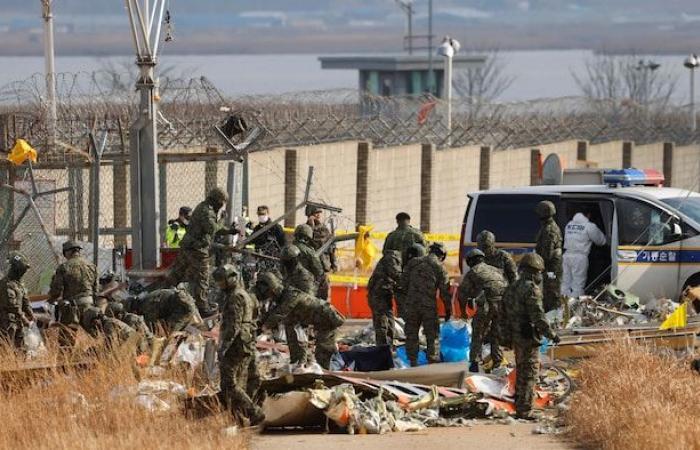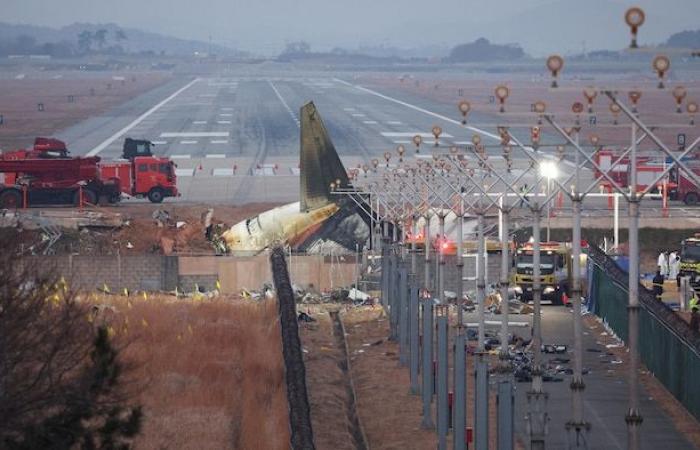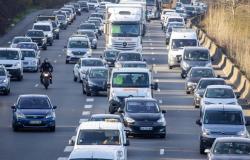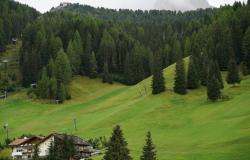South Korea launched a “comprehensive inspection” of all Boeing 737-800 planes used by the country’s airlines on Monday, the day after the crash of one of these planes in Muan which killed 179 out of 181 people. passengers.
A video of the crash that occurred on Sunday morning, broadcast by the local channel MBC, went around the world: we see a plane landing at Muan airport on its belly, smoke escaping from its engines, before hitting a wall at the end of the runway and being engulfed in flames.
This Boeing 737-800 from the South Korean low-cost airline Jeju Air, coming from Bangkok, was carrying 175 travelers and 6 crew members. All its passengers were killed, according to the final assessment of the emergency services, with the exception of two flight attendants.
The people on board, two Thai nationals and the rest South Korean citizens, ranged in age from 3 to 78 years old.
General inspection
The identities of 146 of the 179 dead have been confirmed so far, according to Vice Minister of Aviation Joo Jong-wan, who announced that Seoul had launched a complete inspection
of the 101 Boeing 737-800s used by airlines in the country.
Open in full screen mode
Soldiers were still searching the wreckage of the plane Monday.
Photo : Reuters / Kim Soo-hyeon
The country declared a seven-day national mourning and flags were flown at half-mast, with interim President Choi Sang-mok at the scene of the tragedy for a commemoration ceremony.
According to authorities, the presumed cause of the tragedy is a collision with birds, which haunts pilots, especially when it comes to jet aircraft whose engines can quickly lose power or stop completely after sucking in a bird.
In Muan on Monday morning, a middle-aged man and woman peered through gates at the crash site where seats, doors and twisted metal were still scattered.
I had a son on that plane
said to theAFP an old man waiting at the airport, explaining that his body had still not been identified.
Airport architecture called into question
Despite the bird-collision thesis, critics are increasingly focusing on the airport’s architecture.
Open in full screen mode
The presence of a concrete wall at the end of the runway at Muan airport raises many questions about runway design.
Photo : Reuters / Kim Hong-Ji
Despite the emergency, the landing was remarkably well executed
Kim Kwang-il, professor of aeronautical sciences at Silla University and former pilot, told AFP.
More normally, there is no such solid obstacle at the end of the runway; it is against international aviation safety standards recommended by […] the International Civil Aviation Organization (ICAO) and the European Union Aviation Safety Agency (AUESA). The structure in question caused the plane to crash and burst into flames
he says.
Most of the passengers died because of this obstacle; it’s upsetting
he deplores, calling on the airport authorities to be held accountable.
In terms of the investigation, the black boxes – the cockpit voice recorder and the flight data recorder – were found on Sunday.
The United States National Transportation Safety Agency has composed a team of American investigators
including Boeing, for help
the South Korean authorities.
Serial flight cancellations for Jeju Air
South Korean airline Jeju Air announced Monday that it was suffering a series of cancellations the day after the crash.
From Sunday midnight to 1 p.m. today, the number of canceled flights is approximately 68,000
an official told AFP.
About 33,000 cancellations are for domestic flights, and the rest are for international flights, according to the low-cost carrier source, who spoke on condition of anonymity.
Travel agencies also reported cancellations on Monday.
We identified at least 400 in the first hour of opening
specified to theAFP an official from one of South Korea’s largest agencies, speaking on condition of anonymity.
Many customers ask if they are going to fly on a Boeing 737-800 and, if so, want to cancel [leur vol]
he added.
New incident
On Monday morning, another Jeju Air Boeing 737-800 encountered a landing gear problem, already blamed on Sunday.
The captain contacted ground control and, after taking additional measures, the landing gear returned to normal operation. However, it was decided to return to the airport
from Gimpo shortly after takeoff, Song Kyung-hoon, a company official, told the press.
The Muan crash is the first fatal accident for Jeju Air, which presented its sincere apologies
.
The South Korean air transport sector is considered generally reliable by experts, with such tragedies being very rare.
The deadliest accident to take place in South Korea until Sunday was the crash on a hill near Busan-Gimhae Airport of an Air China Boeing 767 coming from Beijing, which had left 129 dead on April 15, 2002.







